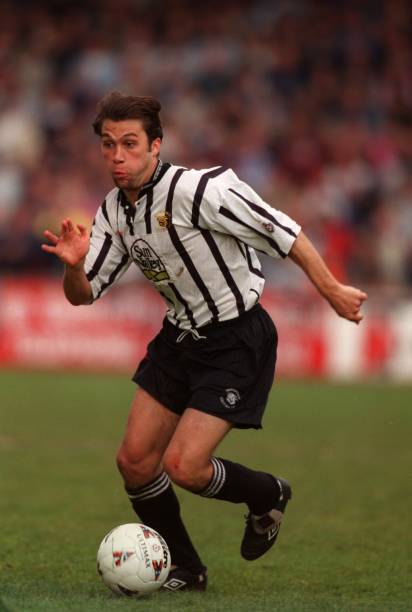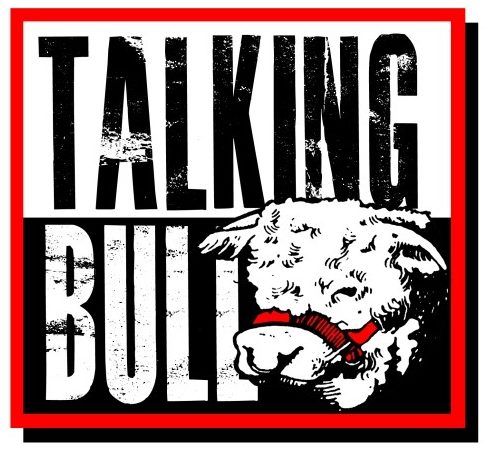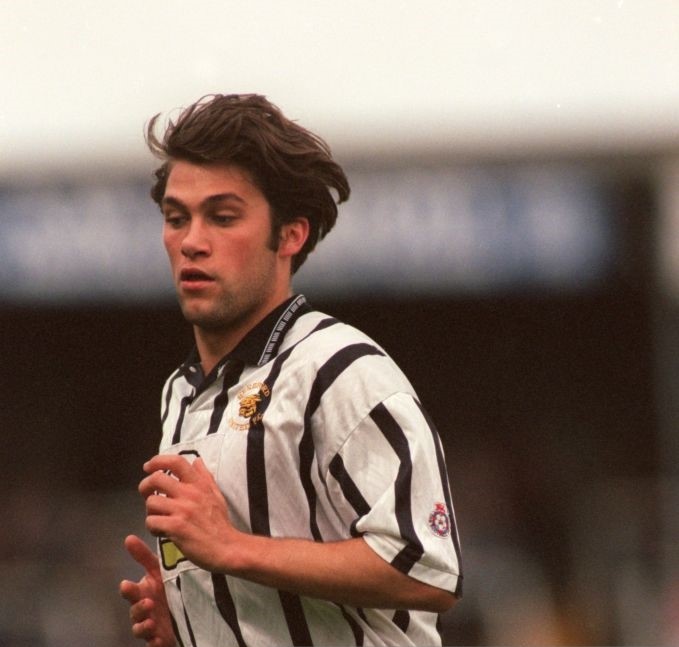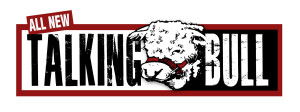Here at Talking Bull we are continuing to build up our archive focussing on former Hereford Heroes. This time we cast our eye over a left-back from the mid 1990’s who made his debut somewhat unexpectedly, but quickly became a fans favourite:
MURRAY FISHLOCK
Occasionally a young player gets thrown in at the deep end and thrives. Hereford were struggling during Greg Downs’ tenure as player-manager and were tumbling towards another relegation threatened season in 1994/95. A Steve White goal had given the team a boost by winning 1-0 at the Hawthorns against West Bromwich Albion in the League Cup, but Downs was sacked after 5 defeats in a five-week opening spell. John Layton stepped forward as caretaker-boss and immediately drafted in new signing Murray Fishlock, who relished the opportunity.
Fishlock (born 23 September 1973) was born in Marlborough, Wiltshire and began his career as a junior with Swindon Town. However, he was unable to make an instant breakthrough into the Football League with the Robins and linked up with Gloucester City in 1992, where he made 74 appearances and scored 6 goals in all competitions.
Based in Pewsey, Wiltshire Murray was studying at college in Bristol as well as training twice a week with Gloucester and decided to move closer to home joining Trowbridge. But within weeks he was a full-time professional with Hereford as Layton swooped, offering him a league contract.
He was to make his debut against Scunthorpe on 1 October 1994 in a 2-1 home win thanks to goals from White and, another veteran striker, Nicky Cross. Indeed, three days later he was to play superbly against Nottingham Forest in a 0-0 League Cup draw at Edgar Street in front of an 8,953 crowd. The Forest line-up included Mark Crossley, Des Lyttle, Stuart Pearce, Steve Chettle, Steve Stone, Dutchman Bryan Roy and Stan Collymore. This only 10 days after Murray had appeared for Trowbridge in the Beazer Homes League!
Fishlock kept his place in the side for the next three months until breaking a toe against Preston North End in an ill-tempered clash at Deepdale, with Dick Bate joining the Bulls’ coaching staff. Hereford lost 4-2 but Layton was fuming as the home side were awarded two controversial penalties. The first given as the ball hits Tony James’ boot before striking Andy Reece on the hand. A second is for an innocuous push by Gareth Davies.
Murray had to wait until March before making his return. By this time Hereford had gradually improved and were a much more difficult team to beat. Indeed, with the left-back restored to the defence alongside Dean Smith, John Brough and an emerging Gareth Stoker, the Bulls only lost one of their last 11 matches, finishing 16th in Division Three.
Graham Turner took over as the Hereford manager in the summer as United continued on an upward curve. Fishlock was to score his first goal for the club in a 2-2 draw at Cambridge United at the start of the season, heading in a Tony Pounder cross in only the second minute. A Brough own goal followed before Steve Butler put the home side ahead. Reece then hit the crossbar before Neil Lyne bagged Hereford a deserved point just after half-time.
Turner often deployed Fishlock as an attacking wing-back, and his ability to sweep forward down the flanks became a genuine asset, as Hereford climbed the division. Indeed, even promotion was becoming a realistic aim, but first to come was an FA Cup run.
 The Bulls beat Stevenage Borough 2-1 at Edgar Street with goals from White and Cross in the 1st Round. Another home victory, 2-0 over Sutton United swiftly followed in Round Two with marksman White bagging another brace. This set up the mouth-watering prospect of Tottenham Hotspur in an all-ticket affair in the 3rd Round.
The Bulls beat Stevenage Borough 2-1 at Edgar Street with goals from White and Cross in the 1st Round. Another home victory, 2-0 over Sutton United swiftly followed in Round Two with marksman White bagging another brace. This set up the mouth-watering prospect of Tottenham Hotspur in an all-ticket affair in the 3rd Round.
In the highlight of his career at Hereford, the Bulls produced some terrific football in front of an 8,806 crowd. Ronny Rosenthal headed Spurs in front on 31 minutes, but back came Hereford. Dean Smith somehow blasted a penalty over the cross bar at the Meadow End, before a bullet header from Brough forced a replay at White Hart Lane. Fishlock put in a spirited performance in front of a 31,534 crowd but Teddy Sheringham (3) and Chris Armstrong (2) destroyed the Bulls dreams of a famous cup upset.
The cup performances inspired the whole Hereford squad, who went on to finish 6th in the league and a place in the divisional play-offs. Consistency and confidence had grown, and despite a hectic run-in the players morale was sky high. The Bulls lost just five of the last 23 games.
During this run Fishlock scored with a header in a 2-2 draw at Preston, and a last-minute goal at Ninian Park against Cardiff City, prior to the final two home games of the campaign. The left back produced arguably his best ever performances for Hereford in first, a 4-1 demolition of Hartlepool, before a 2-0 victory over Rochdale with a near 6,000 crowd celebrating a play-off berth. But in an Edgar Street low point, Murray featured in both matches against Darlington who prevented Hereford’s passage to Wembley, defeating the Bulls 4-2 on aggregate.
Worse was to follow as although Fishlock retained a place in the Bulls’ squad and scored another rare goal in a 3-1 success over Wigan Athletic at Edgar Street on 1st February 1997, Armageddon loomed. A record equalling run of 13 league games without a win saw United slump to the foot of the table thanks to a 2-1 defeat at Leyton Orient in the penultimate game of the season. Next up, Brighton in the last game. Only a win would be enough. United drew and were relegated from the Football League on goals scored – or in Hereford’s case “lack of” goals scored.
The wing-back showed loyalty and commitment by remaining at Edgar Street in the Vauxhall Conference the next season, making 48 appearances. Only Gavin Mahon featured more times as Hereford finished 6th behind Morecambe, Rushden, Woking, Cheltenham and Halifax Town who were promoted back to the league.
Murray left Edgar Street to link up with rivals Yeovil Town in the summer of 1998 and went on to play 57 times for the Glovers, including a goal against his former club in a 3-0 win over Hereford on 13 March 1999. The left-back was also capped by the England semi-professional team, before a back injury in a game against Dover in January 2000 curtailed his career.
He was a thorough professional and, an excellent player, much-loved at Hereford and Yeovil. Although he tried to return featuring in a few games for Woking, Melksham Town, Chippenham and Pewsey Vale his injury forced him to retire.
Fishlock now works for the Football Foundation, leading a team of Engagement Managers, Grant Managers and Technical Project Managers investing capital funding into sports facilities and hubs across the country.
Perhaps he will be able to assist Hereford in their quest to develop the Blackfriars Street in the future?


